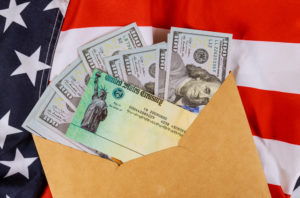2020 Stimulus Bill: SBA Loan Programs
On Friday, March 27, 2020, the United States House of Representatives passed, and President Trump signed into law, the Coronavirus Aid, Relief, and Economic Security Act (the “CARES Act”), a $2 trillion stimulus package which is intended, in part, to provide relief and assistance to small businesses impacted by the COVID-19 crisis and to incentivize those businesses to maintain employee levels and pay certain business operational expenses. Additional guidance was issued by the Small Business Administration on April 1, 2020.
 The Paycheck Protection Program portion of the CARES Act (the “PPP”) serves as an expansion of the SBA’s existing Section 7(a) loan program and provides favorable terms to qualified small businesses. As amended, the Section 7(a) loan program has an authorized level of $349 billion in loans to grant through June 30, 2020.
The Paycheck Protection Program portion of the CARES Act (the “PPP”) serves as an expansion of the SBA’s existing Section 7(a) loan program and provides favorable terms to qualified small businesses. As amended, the Section 7(a) loan program has an authorized level of $349 billion in loans to grant through June 30, 2020.
Key terms of the PPP include:
- All businesses with fewer than 500 employees that were in operation on February 15, 2020 can apply.
- Qualified small businesses can access up to $10,000,000 through the PPP, based on a formula established under the CARES Act.
- Loans carry a 0.50% fixed rate, a two year term and no prepayment penalty.
- No collateral nor a personal guaranty is required.
- Loan payments will be deferred for 6 months.
- Portions of the loans used to cover payroll costs (capped at $100,000 on an annualized basis per employee), mortgage interest, rent and utility costs over the eight week period after the loan is made will be forgiven to the extent the businesses maintain their pre-COVID-19 employee and compensation levels.
- A borrower will not be penalized by a reduction in the amount forgiven for termination of an employee or reductions in salary made between February 15, 2020 and April 26, 2020, as long as the employee is rehired or the salary and wages increased to the prior levels by June 30, 2020
Loans under the PPP can be applied for by small businesses beginning April 3, 2020 through existing SBA lenders (and April 10, 2020, for independent contractors and self-employed individuals). The SBA guidance anticipates that not more than 25% of the forgiven amount may be for non-payroll costs.
In addition to expanding the Section 7(a) loan program, the CARES Act also made several changes to the Economic Injury Disaster Loan (“EIDL”) Program under Section 7(b) of the Small Business Act.
Under the EIDL Program:
- The SBA can provide up to $2 million in disaster assistance to small businesses or private, nonprofit organizations that suffer substantial economic injury as a result of a declared disaster, regardless of whether the applying entity sustained physical damage.
- Applicants under this program may request a $10,000 advance on their loan, which advance is not required to be repaid.
- While a borrower may receive an EIDL loan and loans under other programs (such as the PPP), the basis for the loan/costs being paid with each must be different. In other words, a small business will need to make a determination as to whether the Section 7(a) loan program or the EIDL Program is most appropriate for it. Small businesses cannot use both SBA loan programs for the same purpose.
SRVH is committed, during this time and all times, to providing effective legal advice and guidance to our clients. To the extent you have more questions or need more information or assistance regarding any of the provisions and relief opportunities provided under the CARES Act, please reach out to any of our attorneys for assistance.
Photo By ungvar from Shutterstock





